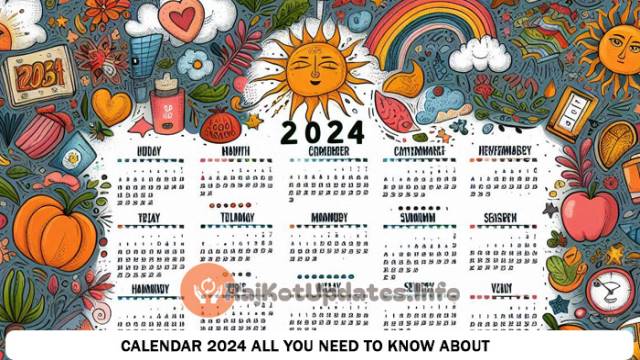Calendar 2024 All You Need to Know About

Introduction
Planning for the year ahead is crucial, and having a well-organized Calendar 2024 can help you stay on top of important dates and events. Whether it’s scheduling holidays, setting goals, or managing daily tasks, a calendar is an indispensable tool. The year 2024 brings new opportunities and challenges, making it essential to have a reliable system in place to keep track of everything.
A Calendar 2024 is not just a collection of dates; it’s a comprehensive tool that can help you streamline your activities and boost productivity. From printable calendars to digital planners, there are various options available to suit your needs. This guide will provide you with insights on how to effectively use a calendar, highlighting the benefits and offering tips on customizing it to fit your lifestyle.
In this article, we will explore different types of calendars, including yearly, monthly, and weekly planners. We’ll also delve into the key dates and holidays in 2024, offering tips on how to incorporate them into your schedule. Additionally, we’ll discuss how to personalize your calendar with notes and reminders, and introduce some digital tools that can enhance your planning and organization.
Printable 2024 Calendars
Having a printable Calendar 2024 can be incredibly handy for planning and organizing your year. Whether you prefer a yearly overview, a monthly planner, or a more detailed weekly schedule, there are various types of calendars to suit your needs. Here are some benefits and tips on how to use printable calendars effectively:
Types of Calendars:
- Yearly Calendar: Provides a comprehensive view of the entire year, making it easy to mark important dates and plan long-term goals.
- Monthly Calendar: Offers a more focused view, allowing you to plan month-by-month. It’s great for tracking specific events, appointments, and deadlines.
- Weekly Calendar: Breaks down your schedule into weekly segments, perfect for detailed planning and keeping track of daily tasks.
Benefits of Using Printable Calendars:
- Flexibility: You can choose a layout that best fits your planning style and needs.
- Customization: Printable calendars can be personalized with notes, reminders, and color-coding to enhance organization.
- Accessibility: Having a physical calendar at your desk or on your wall keeps important dates in sight and top-of-mind.
How to Download and Print Calendars:
- Many websites offer free printable Calendar 2024 in various formats, including PDF. Simply search for “download 2024 calendar” to find a template that suits your preferences.
- Once you find a suitable calendar, download the file and print it using your home printer. Make sure to use high-quality paper for a durable and clean finish.
Using a printable calendar can significantly enhance your planning and organization for 2024, helping you stay on top of your schedule and achieve your goals.
Key Dates and Holidays in 2024
Knowing the key dates and holidays in 2024 is essential for effective planning. Whether you’re scheduling vacations, planning events, or simply looking to stay organized, being aware of these important dates can help you make the most of your year. Here are some major holidays and observances around the world, along with tips on planning for these important dates.
Major Holidays and Observances Around the World:
- New Year’s Day: January 1, 2024 (Global)
- Chinese New Year: February 10, 2024 (China, and other East Asian countries)
- Easter: March 31, 2024 (Western Christianity), May 5, 2024 (Eastern Christianity)
- Labor Day: May 1, 2024 (Many countries worldwide)
- Independence Day (USA): July 4, 2024
- Diwali: October 28, 2024 (India and other countries)
- Christmas Day: December 25, 2024 (Global)
Public Holidays in Different Countries:
- United States: Memorial Day (May 27), Independence Day (July 4), Thanksgiving (November 28)
- United Kingdom: Bank Holidays, Easter Monday (April 1), Christmas Day (December 25)
- Australia: Australia Day (January 26), Anzac Day (April 25), Queen’s Birthday (June 10)
- India: Republic Day (January 26), Holi (March 25), Gandhi Jayanti (October 2)
- Canada: Victoria Day (May 20), Canada Day (July 1), Thanksgiving (October 14)
Planning for Important Dates and Events:
- Vacation Planning: Use the calendar to plan vacations around long weekends and public holidays for extended breaks.
- Event Scheduling: Mark birthdays, anniversaries, and other personal milestones. Use the calendar to avoid scheduling conflicts and to plan events in advance.
- Work and School: Keep track of important work deadlines, school holidays, and exam dates to stay organized and on top of your responsibilities.
By integrating these key dates and holidays into your Calendar 2024, you can ensure that you are prepared for the year ahead. This will help you balance work, personal life, and leisure activities effectively.
Customizing Your Calendar
Personalizing your 2024 calendar can make it an even more effective tool for planning and organization. Here are some tips on how to customize your calendar to fit your personal needs and preferences:
Tips for Personalizing Your Calendar with Notes and Reminders:
- Color-Coding: Use different colors for different types of events or tasks. For example, use one color for work-related events, another for personal appointments, and another for holidays.
- Sticky Notes: For a tactile approach, use sticky notes for important reminders and move them around as needed.
- Highlighting: Highlight key dates such as deadlines, birthdays, and anniversaries to make them stand out.
Adding Personal Events and Milestones:
- Birthdays and Anniversaries: Mark special dates to ensure you never miss an important occasion.
- Goal Setting: Add milestones for personal or professional goals. This helps you track your progress and stay motivated throughout the year.
- Appointments and Meetings: Record all appointments, meetings, and important events to keep your schedule organized.
Using Digital Tools for Calendar Customization:
- Digital Calendars: Platforms like Google Calendar, Microsoft Outlook, and Apple Calendar allow you to easily add, edit, and customize events. They offer features such as reminders, recurring events, and syncing across devices.
- Apps and Extensions: Use productivity apps and calendar extensions like Todoist, Trello, or ClickUp to integrate your calendar with task management tools. This can enhance your planning and organization by combining your schedule with your to-do lists.
- Customization Features: Many digital calendar tools offer customization features such as adding notes, attachments, and links to events. Explore these features to make the most of your digital calendar.
Customizing your calendar to suit your unique needs can greatly enhance its utility and help you stay organized and on top of your tasks in 2024.
Planning and Organization Tips for 2024
Planning and Organization Tips for 2024
Effective planning and organization are key to making the most out of your year. Here are some tips to help you utilize your Calendar 2024 for better planning and time management:
How to Effectively Use a Calendar for Planning:
- Set Clear Goals: At the beginning of the year, outline your main goals. Break them down into monthly and weekly targets, and mark these milestones on your calendar.
- Regular Reviews: Schedule regular check-ins with yourself. Use your calendar to review your progress weekly or monthly, adjusting your plans as needed.
- Prioritize Tasks: Use your calendar to prioritize your tasks. Mark the most important tasks with specific colors or symbols to ensure they receive your attention first.
Tips for Staying Organized Throughout the Year:
- Daily Planning: Start each day by reviewing your calendar. This helps you stay focused on what needs to be done and prevents tasks from slipping through the cracks.
- Use Reminders: Set up reminders for critical deadlines and appointments. Digital calendars are particularly useful for this, as they can send notifications directly to your devices.
- Declutter Regularly: Periodically declutter your calendar by removing outdated or irrelevant entries. This keeps your schedule clean and focused on the most important tasks.
Setting Goals and Tracking Progress:
- SMART Goals: Set SMART (Specific, Measurable, Achievable, Relevant, Time-bound) goals. Write these goals on your calendar, breaking them into manageable tasks.
- Track Progress: Use your calendar to track your progress towards your goals. Regularly update it with your achievements and any adjustments you need to make.
- Reflect and Adjust: At the end of each month, take some time to reflect on your progress. Use this reflection to adjust your plans and set new goals for the coming month.
Time Management Strategies:
- Block Scheduling: Allocate specific blocks of time for different tasks or activities. This helps in managing your time effectively and ensuring you dedicate enough time to each task.
- Focus Time: Set aside uninterrupted time slots for focused work. Mark these slots on your calendar to prevent distractions and boost productivity.
- Balance Work and Leisure: Ensure your calendar includes time for relaxation and hobbies. Balancing work and personal time is crucial for maintaining overall well-being.
By implementing these planning and organization tips, you can make your Calendar 2024 a powerful tool for achieving your goals and staying organized throughout the year.
Conclusion
In summary, having a well-organized Calendar 2024 is essential for effective planning and organization. Whether you’re managing personal schedules, tracking important dates, or setting and achieving goals, a comprehensive calendar can be a powerful tool.
From printable calendars that you can customize with notes and reminders, to digital tools that offer flexibility and convenience, there are numerous options to suit your needs. Understanding the key dates and holidays in 2024 allows you to plan ahead and make the most out of your year. Customizing your calendar helps you personalize it to your lifestyle, ensuring you stay on top of your schedule and responsibilities.
Effective planning and organization tips like setting SMART goals, using reminders, and practicing time management strategies can help you maximize productivity and achieve a balanced life. Regular reviews and adjustments to your plans ensure that you stay on track with your objectives throughout the year.
As you prepare for 2024, remember to utilize your calendar to its fullest potential. Start planning now, and make the upcoming year your most organized and productive yet.
Calendar 2024 FAQs
Why is 2024 a leap year?
2024 is a leap year because it’s divisible by 4. This extra day keeps our calendar in sync with the Earth’s orbit around the Sun.
What’s the deal with Leap Day, February 29?
Leap Day is added to the calendar every 4 years. It fixes the drift that occurs because a year is not exactly 365 days but 365.25 days.
How do leap years impact holidays and observances?
Leap years can move holidays and observances. For example, in 2024 Christmas will be on a Wednesday and Thanksgiving on the 28th of November instead of the 25th.



